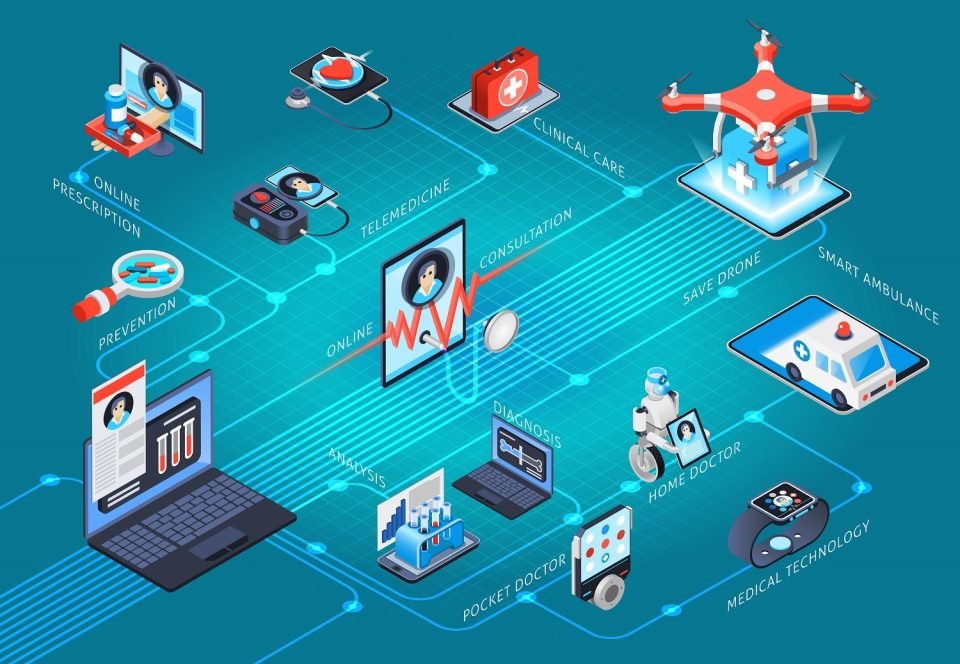As these technologies become more widespread, they promise to usher in a new era of healthcare delivery that is more efficient, accessible, and effective than ever.
In recent years, the healthcare industry has witnessed a significant transformation with the advent of integrated telemedicine solutions. These innovative technologies include a range of tools for the delivery of remote healthcare through:
- Teleconsultation platforms
- Access to electronic health records (EHRs)
- Patient scheduling systems
- Prescription management
- Remote patient monitoring systems
These tools are reshaping the landscape of patient care and driving improved outcomes. By seamlessly connecting patients, healthcare providers, and critical medical information, integrated telemedicine solutions offer services that benefit both patients and healthcare providers.
Electronic Health Records (EHR) System
The electronic health record (EHR) system is at the core of integrated telemedicine solutions. EHRs have replaced traditional paper-based medical records, offering a comprehensive digital repository of patient information. This secure, centralized database stores a patient’s medical history, diagnoses, medications, treatment plans, immunization status, radiology images, and laboratory test results.
The Benefits of EHRs Are Manifold
EHRs provide healthcare professionals with instant access to up-to-date patient information, enabling more informed decision-making and reducing the risk of medical errors. They also facilitate better coordination among healthcare providers, ensuring continuity of care across various medical settings. Additionally, they empower patients by granting them access to their health information, fostering greater engagement in their healthcare journey.
Remote Patient Monitoring: Bridging the Gap Between Hospital and Home
Remote patient monitoring (RPM) technology has emerged as a game-changer in chronic disease management and post-operative care. These systems allow healthcare providers to track patients’ vital signs and health data in real time outside traditional healthcare settings. Patients can use connected devices to measure and transmit blood pressure, oxygen saturation, heart rate, blood glucose levels, and other parameters to their healthcare providers for timely decision-making.
RPM provides continuous monitoring and support for patients with chronic conditions, leading to better disease management and improved quality of life. Additionally, RPM can significantly reduce healthcare costs by minimizing hospital readmissions and unnecessary in-person visits, which could lead to hospital-acquired infections in some immunocompromised patients.
Enhancing Patient Care and Outcomes
The integration of EHRs and RPM technologies creates a robust ecosystem that enhances patient care in numerous ways:
- Improved Access to Care: Telemedicine solutions break down barriers to healthcare access.
- Enhanced Efficiency: Digital systems streamline workflows, predict outcomes, and personalize treatment plans.
- Patient Empowerment: Access to personal health information and real-time monitoring encourages patients to take a more active role in managing their health.
- Cost-Effectiveness: These solutions can significantly lower healthcare costs by reducing hospital readmissions, minimizing unnecessary visits, and improving overall health outcomes.
As Technology Continues to Evolve
The potential of integrated telemedicine solutions will only grow. From artificial intelligence-powered diagnostics to virtual reality rehabilitation programs, the future of healthcare looks increasingly digital, connected, and patient-centric. While data security and digital literacy challenges must be addressed, the benefits of integrated telemedicine solutions in enhancing patient care and outcomes are undeniable. As these technologies become more widespread, they promise to usher in a new era of healthcare delivery that is more efficient, accessible, and effective than ever.
TCE Group specializes in healthcare applications, systems integration, hardware & software development, project management complete with training and tech support.
We combine our multiple decades of expertise in healthcare and process re-engineering with advanced problem solving and the ability to work collaboratively with other departments and vendors to solve complex issues with innovative solutions
We’ve launched a medical second opinion platform that uses Speech-to-Speech translation and AI generation of medical reports utilizing IBM watsonx.ai. Imbedded technology that will save physicians 10-20 minutes per each patient encounter, as a result, patients avoid long wait times to see a doctor in a clinic or hospital.
